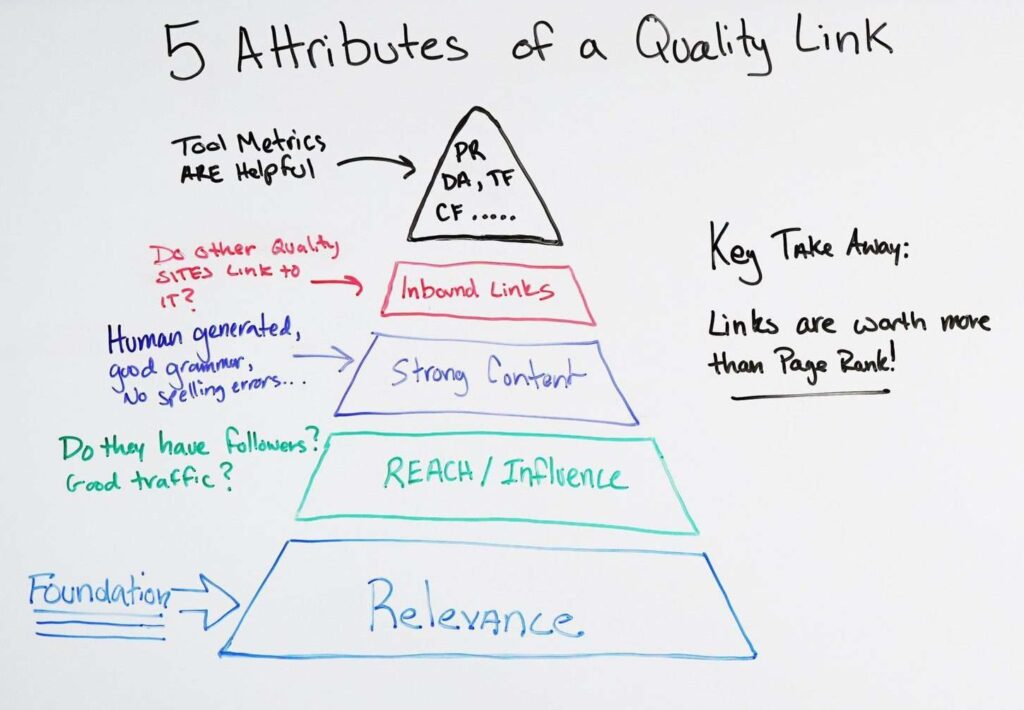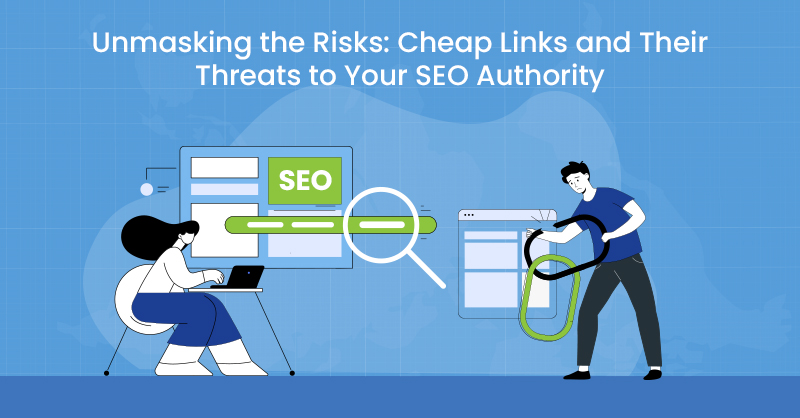We’re all trying to increase our SEO authority and link-building is an important tool. But while the prospect of cheap links sounds alluring, it’s likely a poor investment. Google knows the difference between a link from the New York Times and one from your local weekly rag. It also recognizes the batch links that scam artists are promoting in their frequent emails. While they provide statistics that validate their success, be wary. You can sell anything with statistics, but they don’t tell the whole story.
Read on to learn about the dark side of cheap links and why you need to be focusing on quality links. If you’ve been penalized, learn what to do about it.
Have you wondered why your website isn’t ranking higher?
You’re doing everything right, but you still can’t get your rankings up. It could be those seemingly cheap links you snagged. In the SEO world, your website’s authority dictates your online credibility and visibility. Here’s the catch: the quality of links pointing to your site directly impacts that authority. Low-quality links, disguised as quick wins, can secretly chip away at your SEO authority.
Source: Vazoola
Link quality boils down to trust and relevance. Imagine friends recommending a great restaurant, or parents recommending the best schools—you trust their opinion. Search engines work similarly, using links as a vote of confidence. The more high-authority sites link to you, like news and press releases, the more search engines recognize you as a valuable resource of information.
Low-Quality Links Damage Your Website’s Reputation
But here’s the twist: grabbing any link you find is like hanging out with the wrong crowd. You might get some attention, but it backfires. These low-quality links damage your website’s reputation in search engines’ eyes, hurting your ranking potential.
Building a strong SEO authority requires focusing on high-quality backlinks – links from reputable, relevant websites. These high-quality links serve a dual purpose: sending positive signals to search engines and attracting targeted traffic to your site, which leads to a more engaged audience. In short, ditch the cheap tricks and invest in quality backlinks to completely dominate the online game.
Understanding Link Quality and Its Impact on SEO
Considering bargain-basement links a magic bullet for SEO? Wrong turn! Your website’s SEO authority and its ranking power rely heavily on the quality of links pointing to it. Think of links like recommendations. A trusted friend’s rave review carries way more weight than a random compliment from a stranger.
Search engines see backlinks from established, trustworthy websites as a thumbs-up for your content. These high-quality links boost your SEO authority, making you a more credible and relevant resource in their eyes. But here’s the catch: low-quality links, like hanging out with the wrong crowd, can damage your reputation. These shady links can silently weaken your SEO authority, pushing you down the search rankings and hindering your online visibility.
- Low-quality sites: Cheap links often come from websites with low traffic and bad content. Search engines don’t see these as valuable endorsements.
- Unnatural link profile: If you suddenly have a bunch of links from unrelated websites, it looks suspicious to search engines. They might think you’re trying to game the system.
- Penalty risk: In the worst-case scenario, search engines might penalize your website, dropping your ranking in search results. Ouch!
Identify the Low-Quality Links That Are Undermining Your SEO Value
Regarding your website’s ranking on Google, the links pointing to it matter a lot. However, not all links are created equal. Some, like those from high-quality websites, can boost your SEO. Others, the low-quality kind, can drag you down. So, how can you tell the good from the bad? Here are some red flags to watch out for:
- The shady neighbourhood test: Imagine the website linking to you. Is it a trusted source in your field, like a respected news site or industry blog? Great! But if it looks like it popped up overnight selling discount shoes and “miracle” weight loss pills, that’s a bad sign. Quality websites linking to yours are a good thing, shady ones are not.
- The content checkup: If the website linking to you is full of typos, weird grammar, and articles promising things that sound too good to be true (like getting rich-quick schemes), that’s not a great endorsement for your site.
- The link-fest frenzy: Does the website have links crammed everywhere, like walls plastered with ads? Websites that just seem to be churning out links for anyone who will pay are probably not the best company to keep.
- The broken backlink blues: Is the link leading to a dead page or something completely unrelated to your website? Broken links don’t do you any favours. Google wants to show users relevant and working websites.
- The anchor text alarm: Anchor text is the clickable text of the link. If it is full of spammy keywords or has nothing to do with your content, it may raise eyebrows with Google.

Source: IndeedSEO
Benefits of Spotting Sneaky Links Impacting SEO Value
Links are the lifeblood of SEO. They act like votes of confidence from other websites, telling search engines like Google that your website is a valuable resource. However, low-quality links, sometimes identified by their link rating, can hurt your website’s ranking and overall SEO health. Here’s why identifying and removing them is so important:
- Improved search engine trust: When you have a bunch of low-quality links pointing to your site, it sends a mixed message to search engines. These links often come from irrelevant, spammy, or poorly maintained websites. By identifying and removing these low-quality links, you’re cleaning up your backlink profile and showing Google that you deserve to be seen as a credible source.
- Avoiding penalties: Several low-quality links can stimulate a penalty from Google. Regularly checking your link profile and removing low-quality links helps you avoid these penalties so that Google considers you a good friend.
- Enhanced user experience: Shady links hurt you twice: frustrate users with dead ends, and hurt your SEO ranking. Clean them up for a happier audience and search engines!
- Increased link-building efficiency: Once you’ve identified and removed low-quality links, you can focus your energy on building high-quality backlinks coming from reputable websites relevant to your industry.
- Long-term SEO benefits: Removing low-quality links is an investment in your website’s long-term SEO success and helps build your trust with Google.
Climbing Out of the Penalty Box: Strategies for Improving Link Ratings
Ever been penalized because of bad links? Well then, here is the solution:

Source: Smart Marketing
Saving Your Sinking SEO Ship by Building Sustainable Links
Cheap links might seem tempting, but they’re like sirens luring your SEO ship onto the rocks. Instead, focus on building sustainable links that sing a sweeter song for Google.
Here’s the harmonious approach:
- High-quality content: Create top blog posts that are informative and industry-valuable. Great content naturally attracts links like butterflies to flowers.
- Guest blogging: Share your expertise by guest blogging on sites your audience frequents. Include a link back to your blog in your bio, but remember, quality over quantity!
- Community chorus: Join online forums and discussions related to your niche. Help others, build relationships, and establish yourself as a thought leader. Links may follow suit.
- Network with influencers: Befriend other bloggers and influencers in your field. Genuine connections can lead to natural link exchanges or collaborations.
- Offer valuable resources: Create infographics, ebooks, or webinars that people find helpful. These resources become link magnets, attracting backlinks as people share them.
Conclusion
In a nutshell, cheap links are a risky shortcut–they may seem like a quick fix, but they can land you in Google’s penalty zone. Disavow bad links, build good ones, and emphasize quality content. Remember that SEO is a marathon, not a sprint. By investing in sustainable link building, you will build trust with Google and climb the SEO ladder one high-quality link at a time.
FAQs
Q: How can cheap links damage my website’s SEO?
A: Search engines use link quality as a major factor in ranking websites. Cheap links can be seen as manipulative attempts to boost rankings and can lead to penalties like website demotion or even removal from search results.
Q: How do search engines identify cheap links?
A: Search engines use sophisticated algorithms to analyze link quality. Factors like link source relevance, website traffic, and anchor text are considered. Unnatural patterns or irrelevant links raise red flags.
Q: What can I do if my website gets penalized for cheap links?
A: Disavowing low-quality links can help mitigate penalties. This process informs search engines you don’t endorse those links. Rebuilding your backlink profile with high-quality, relevant links is crucial for recovery.
Q: How can I build a safe and effective backlink profile?
A: Focus on creating high-quality content that attracts natural links from other websites. Guest blogging, industry outreach, and creating link-worthy infographics are effective strategies.
For the latest digital marketing news, check out our blog. To schedule an appointment, call 866-208-3095 or contact us here.





